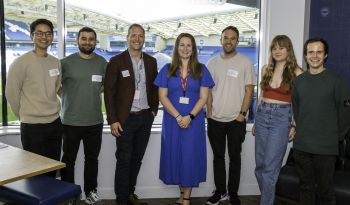Sussex scientists to investigate impact of genetic mutations for aggressive blood cancer
By: Lauren Ellis
Last updated: Tuesday, 21 January 2025

University of Sussex researchers have been awarded funding from an international charity to research how certain genetic mutations worsen survival rates in the disease, acute myeloid leukaemia (AML).
Funding from Worldwide Cancer Research will support research into previously unexplored avenues of Wilms tumor-1 (WT1) gene mutations, frequently found in AML. This latest research has the potential to develop new targeted therapies for patients, which are less toxic and more precise than current chemotherapies.
AML is an aggressive form of blood cancer with survival rates one of the lowest of all cancers, at only 22% survival after five years. Understanding how frequently occurring genetic mutations disrupt gene activation is an important part of research into the disease. Normal gene activation can be simplified into two parts; first the DNA is read and copied, then a template called RNA is created for producing functional molecules in the cell.
The WT1 molecule is vital for normal cell growth and development, but is frequently mutated in many cancers, including AML. While there has been lots of research into how the mutations alter WT1’s known DNA reading and copying role, far less research has gone into how the mutations impact its RNA processing function. This project will examine the influence of WT1 mutations on its ability to bind and regulate RNA in human leukaemia for the first time, leading to a better understanding of what drives diseased cells.
Dr Rhys Morgan and his team at the University of Sussex are focusing on the WT1 gene as there are currently no satisfactory agents for targeting this mutation in AML patients.
The project’s lead researcher and Associate Professor of Cancer Biology at the University of Sussex, Dr Rhys Morgan says:
“We are incredibly pleased to have received this prestigious and rare funding from Worldwide Cancer Research for the discovery phase of our research. The hope is that we can identify aspects of the RNA landscape disrupted by WT1 mutations in leukaemia cells leading to new drug designs to address these troublesome mutations, which hasn’t been done before.
“WT1 mutations are highly prevalent in human cancer, so this work has the potential to not only help those with AML, but also potentially impact those with kidney and lymphoid tumours.
“We are incredibly proud that our work and the potential of this research has been recognised by Worldwide Cancer Research.”
Collaborating with Dr Ben Towler in the School of Life Sciences and Professor Sarah Newbury at the Brighton and Sussex Medical School, this study will exploit two major research specialities at Sussex; the RNA Biology Centre and Haematology Research Group, in adopting cross-disciplinary and innovative approaches to address longstanding challenges in cancer treatment.
Dr Morgan and his team have been researching treatment strategies for AML for seven years at the University of Sussex, and this new project is another step forward in devising new treatment strategies for the disease.
Worldwide Cancer Research funds discovery research into any type of cancer in any location around the world. The charity assesses up to 500 applications from around the globe, during each of its highly competitive grant rounds.
Dr Lynn Turner, Director of Research at Worldwide Cancer Research says:
“Acute myeloid leukaemia is a fast-growing blood cancer with poor survival rates, so we urgently need new cures to help the thousands of people diagnosed around the world each year. Worldwide Cancer Research are proud to support Dr Morgan’s innovative project which will explore how a particular genetic mutation worsens survival rates in AML, and identify new molecular targets for treatments.
“Worldwide Cancer Research funds truly novel ideas that have the potential to revolutionise our understanding of cancer and how to stop it – this project is a fantastic example of this and I hope it will pave the way towards completely new treatments for this devastating disease.”

